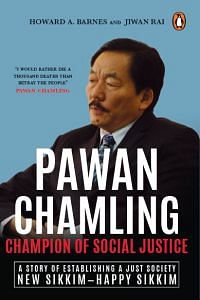
Pawan Chamling: Champion of Social Justice is an unbridled paean to the five-time Sikkim chief minister bereft of any critical outlook.
If Pawan Chamling ever reads this book, he would be looking into a narcissistic mirror image of himself, a Chamling who turns trash into gold.
Let us be clear — the book is biased.
Authored by Howard A Barnes and Jiwan Rai, Pawan Chamling: Champion of Social Justice chronicles the long-term relationship between Sikkim and its five-term Chief Minister. It glorifies Chamling to a point that one forgets whether it is a well-researched biography or an election manifesto. I am yet to find a page that does not claim Sikkim to be superior to other states.
When Sikkim joined the Union of India in 1975, it wasn’t the same as it is now. With rampant poverty, illiteracy, and casteism, it wasn’t a state to be proud of and remained so until 1994, when Pawan Chamling founded the Sikkim Democratic Front (SDF) and got elected as the chief minister of the state. This is what the authors want you to believe.
But the good things first.
Chamling’s extraordinary journey from bringing the state to a brighter morning is remarkably portrayed, especially his focus on “inclusive growth.” Sikkim has seen enormous development under Chamling. According to data from the now defunct Planning Commission and rightly quoted in the book, the proportion of population living below the poverty line came down from 30.9 per cent in 2004-5 to 8.19 per cent in 2011-12. In his first year of office, Chamling dedicated close to one-third of the budget to rural development. Moreover, Sikkim has the maximum per capita spending on education.
The book carefully dismisses the allegations that Chamling practices caste-based politics but goes on to include not one, but four chapters on caste and tribal affairs.
Chamling, and Sikkim, have received several awards and the authors mention it at least twice, if not thrice, to make sure that you remember each of them verbally after reading.
The 200-something page book can be summarised in the following 20 words: “His compassion for the poor is just as genuine as his vision to find the solution to poverty is clear”; the authors’ obsession with Pawan Chamling is unbelievably disturbing and borderline psychotic.
This book has everything good about Chamling and nothing more.
It, however, does justice to the title by calling Chamling a ‘champion of social justice.’ The evidence of that rests on the fact that he holds the record for being the longest serving chief minister of a state, surpassing the late Jyoti Basu.
If you are looking for a light and healthy read, please avoid this.

COMMENTS